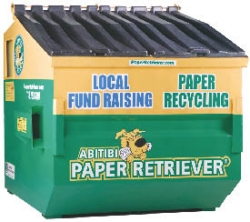Schools, parishes find it’s easy being green
BOSTON -- Many diocesan schools are learning that it pays to be good literally. They are participants in the Abitibi Consolidated Paper Retriever Program. Unlike other programs, which often require schools and parishes and other non-profit communities to pay for services, Abitibi pays these communities for the paper it recycles.
Abitibi Recycling is part of Abitibi Consolidated, a paper manufacturer that supplies many major newspapers including The Boston Globe with newsprint. The recycling process is relatively quick, taking paper from bins to newsstands in about three weeks. Schools are able to earn extra cash and help protect the environment at the same time.
The process is simple. Abitibi supplies each school with a paper recycling bin. A recycling coordinator from within the school community works with Abitibi to create a pick up schedule. Abitibi empties the bins on a weekly or biweekly basis, and schools are rewarded per pound of discarded paper. Who uses the bin is up to the school’s discretion, but opening its access to the wider community enables the school to earn more. Many schools bring in around $2,000 per year.
“It is so easy. I don’t see why all the schools don’t do this,” said Sue Rogge, the coordinator for St. Michael School in North Andover. Recently, St. Michael’s won an award for being a number one recycler in the area.
“It saves us a lot of charges for the school,” she added.
Abitibi works to inspire enthusiasm in school communities.
To kick off the program, representatives from the company make presentations to the entire school community. Encouraging students and faculty to take the lead helps build commitment. For instance, science teachers at St. Michael’s include lessons on the environment in their curriculum, and middle school students take responsibility for emptying classroom bins into the outdoor recycling bin. Another perk of the Abitibi program is that their bins are covered eliminating any mess made by harsh weather -- and attractive.
“The bins are pretty,” said Rogge. “They are not eyesores.”
Abitibi is eager to include more Boston diocesan schools in the program. According to Jason Bean, Abitibi Consolidation Recycling Program’s Greater Boston Area Manager, Catholic communities are particularly successful.
“Catholic communities are our top performers,” he said.
The desire to better serve their communities and the moral obligation to protect the environment are undoubtedly motivating factors. Environmental concerns are fast becoming a focus within the Church. Recently, Archbishop Harry J. Flynn of St. Paul Minneapolis called the global warming “a religious issue,” and this fall hundreds attended a Pax Christi gathering in Eden Prairie, Minn. to learn about climate issues from a Catholic perspective. Programs such as Abitibi’s enable communities to take practical steps to address these environmental concerns.
For further incentive, Abitibi is running a special promotion called, “Schools on Goal,” which enables schools to earn an additional $200. For more information on this promotion and the Abitibi Recycling program, go to www.paperretriever.com.
Perhaps the best incentive to recycle, though, is the glowing response of communities already involved. According to Rogge, “Everybody loves it.” Earn money, save the world, and make the whole community happy -- what could be better?
How is your parish or school working to protect the environment? The Pilot would like to know. Visit TheBostonPilot.com and click on the “Story Idea” link on our homepage.



















